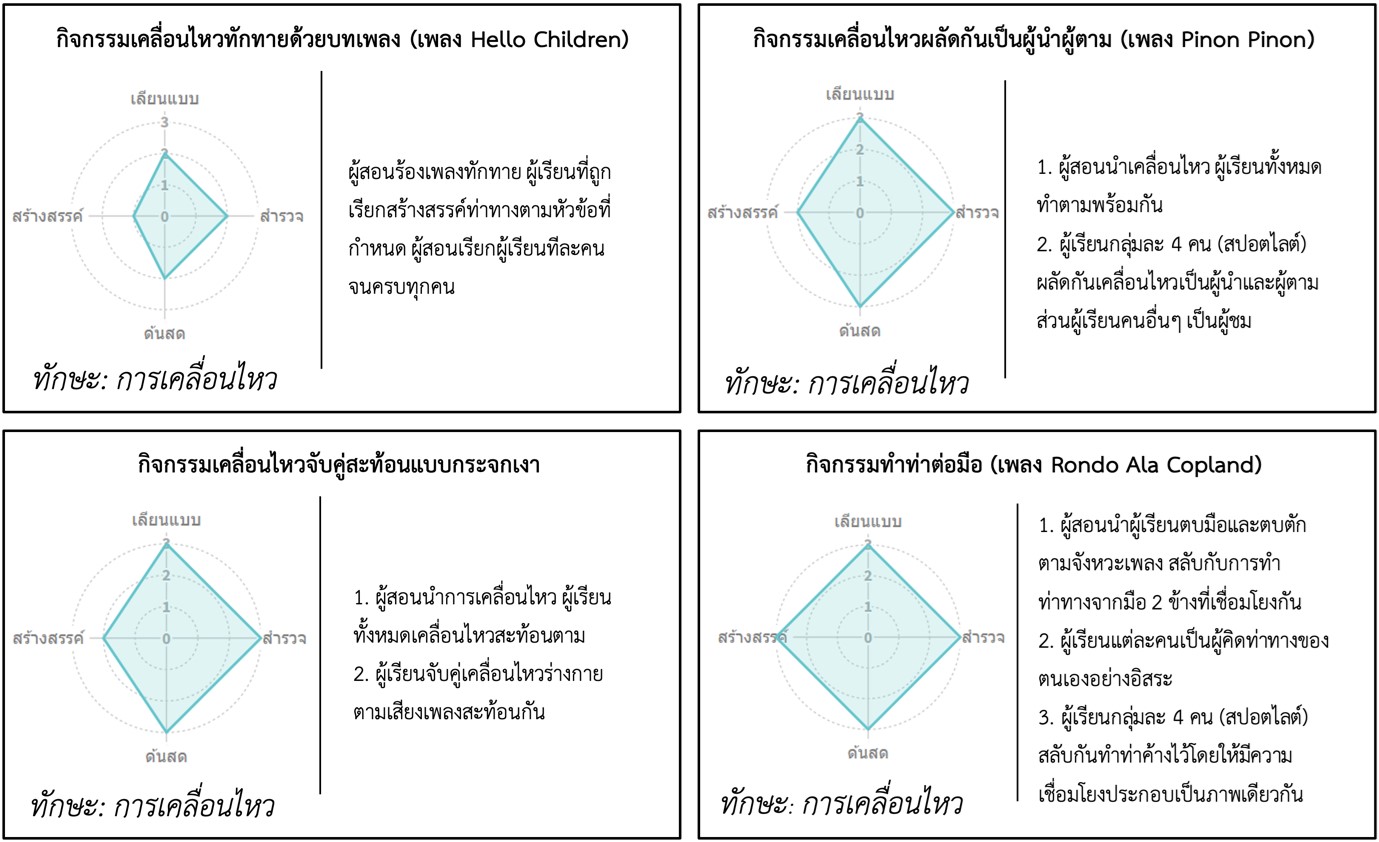Learning by Creating through Online Music Activities: Practical Adaptation from Experienced Orff Instructors in Higher Education
DOI:
https://doi.org/10.14456/educu.2024.28Keywords:
Orff schulwerk, online lesson, music teacher training, music activity, educational technologyAbstract
There are many obstacles and limitations in the management of online Orff lessons. Teachers need to urgently find new teaching strategies in order to provide appropriate teaching and learning that is consistent with the online format. The purpose of this research was to study the adaptation of teachers and approaches for organizing music activities. The research was conducted with a qualitative case study research methodology. Data were collected through in-depth interviews and participatory observation in the online classroom throughout the semester. The results showed that 1) teachers must adapt by incorporating the necessary skills to teach online in music teaching, instruction and technology, and 2) movement activities can be arranged under the technological constraints of online learning formats more than singing and music playing, and emphasize discussion exchanges for understanding Orff approach concepts according to course objectives as compensation for missing activities.
References
ภาษาไทย
ชาย โพธิสิตา. (2565). ศาสตร์และศิลป์การวิจัยเชิงคุณภาพ: คู่มือนักศึกษาและนักวิจัยสังคมศาสตร์. อมรินทร์พริ้นติ้ง แอนด์ พับลิชชิ่ง.
ณรุทธ์ สุทธจิตต์. (2561). ดนตรีศึกษา: หลักการและสาระสําคัญ. สํานักพิมพ์แห่งจุฬาลงกรณ์มหาวิทยาลัย.
ธวัชชัย นาควงษ์. (2542). การสอนดนตรีสำหรับเด็กตามแนวคิดของคาร์ล ออร์ฟ (Orff-Schulwerk). สำนักพิมพ์มหาวิทยาลัยเกษตรศาสตร์. ภาควิชาศิลปะ ดนตรี และนาฏศิลป์ศึกษา คณะครุศาสตร์ จุฬาลงกรณ์มหาวิทยาลัย. (2564). หลักสูตรครุศาสตรบัณฑิต สาขาวิชาดนตรีศึกษา.
ปิยะวรรณ ปานโต. (2563, 5 มิถุนายน). การจัดการเรียนการสอนของไทยภายใต้สถานการณ์การแพร่ระบาดของโรคติดเชื้อไวรัสโคโรนา 2019 (COVID-19). หอสมุดรัฐสภา. https://library.parliament.go.th/th/radioscript/rr2563-jun5
สุภางค์ จันทวานิช. (2554). วิธีการวิจัยเชิงคุณภาพ (พิมพ์ครั้งที่ 10). สำนักพิมพ์แห่งจุฬาลงกรณ์มหาวิทยาลัย.
ภาษาอังกฤษ
Burns, A. M. (2020). Using Technology with Elementary Music Approaches. Oxford University Press, Incorporated.
Creswell, J. W. (2007). Qualitative Inquiry and Research Design: Choosing Among Five Approaches. SAGE.
Creswell, J. W., & Creswell, J. D. (2018). Research Design: Qualitative, Quantitative, and Mixed Methods Approaches. SAGE.
Dorfman, J. (2022). Theory and practice of technology-based music instruction. Oxford University Press.
Frazee, J. (1977). Introduction to the American Orff-Schulwerk education. In H. Regner (Ed.), Music for Children (Orff-Schulwerk, American Edition, Volume 2, Primary). Schott Music Corp.
Johnson, D. (2017). How orff is your schulwerk? Musicworks: Journal of the Australian Council of Orff Schulwerk, 22, 9-14.
Kibici, V. B., & Sarikaya, M. (2021). Readiness levels of music teachers for online learning during the COVID 19 pandemic. International Journal of Technology in Education (IJTE), 4(3), 501-515.
Koutsoupidou, T. (2014). Online distance learning and music training: benefits, drawbacks and challenges. Open Learning, 29(3), 243-255.
Mark, M. L., & Madura, P. (2013). Contemporary Music Education. Cengage Learning.
Martínez Hernández, A. (2021). Online learning in higher music education: Benefits, challenges and drawbacks of one-to-one videoconference instrumental lessons. Journal of Music, Technology and Education, 13(2-3), 181-197.
McTighe, J., Wiggins, G. P., & Wiggins, G. (2004). Understanding by Design: Professional Development Workbook: Association for Supervision and Curriculum Development.
Mosterd, E. J. (2018). Using interactivity to improve online music pedagogy for undergraduate non-majors. In Pedagogy Development for Teaching Online Music (pp. 110-135).
Sever, G. (2021). Opinions of Teachers on the Implementation of the Orff-Schulwerk Approach in Online Lessons. International Online Journal of Educational Sciences, 4(13), 949-964.
Shamrock, M. (1995). Orff Schulwerk: Brief History, Description, and Issues in International Dispersal. American Orff-Schulwerk Association.
Wang, C., & Sogin, D. W. (2013). Orff-Schulwerk research: Where are we? In C. C. Wang & D. G. Springer (Eds.), Orff Schulwerk: Reflections and Directions. I A Pubns.
Yi, S., & Kim, K. (2023). Exploring Possibilities and Approaches for Utilizing SYNCROOM in Online Practical Music Classes. Korean Journal of Research in Music Education, 52(3), 53-74.

Downloads
Published
How to Cite
Issue
Section
License

This work is licensed under a Creative Commons Attribution-NonCommercial-NoDerivatives 4.0 International License.



